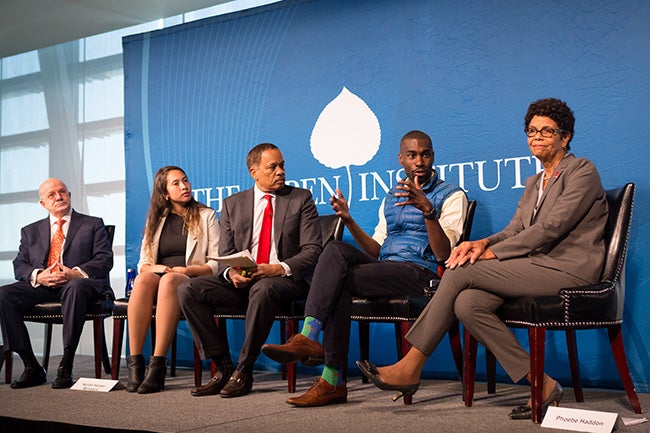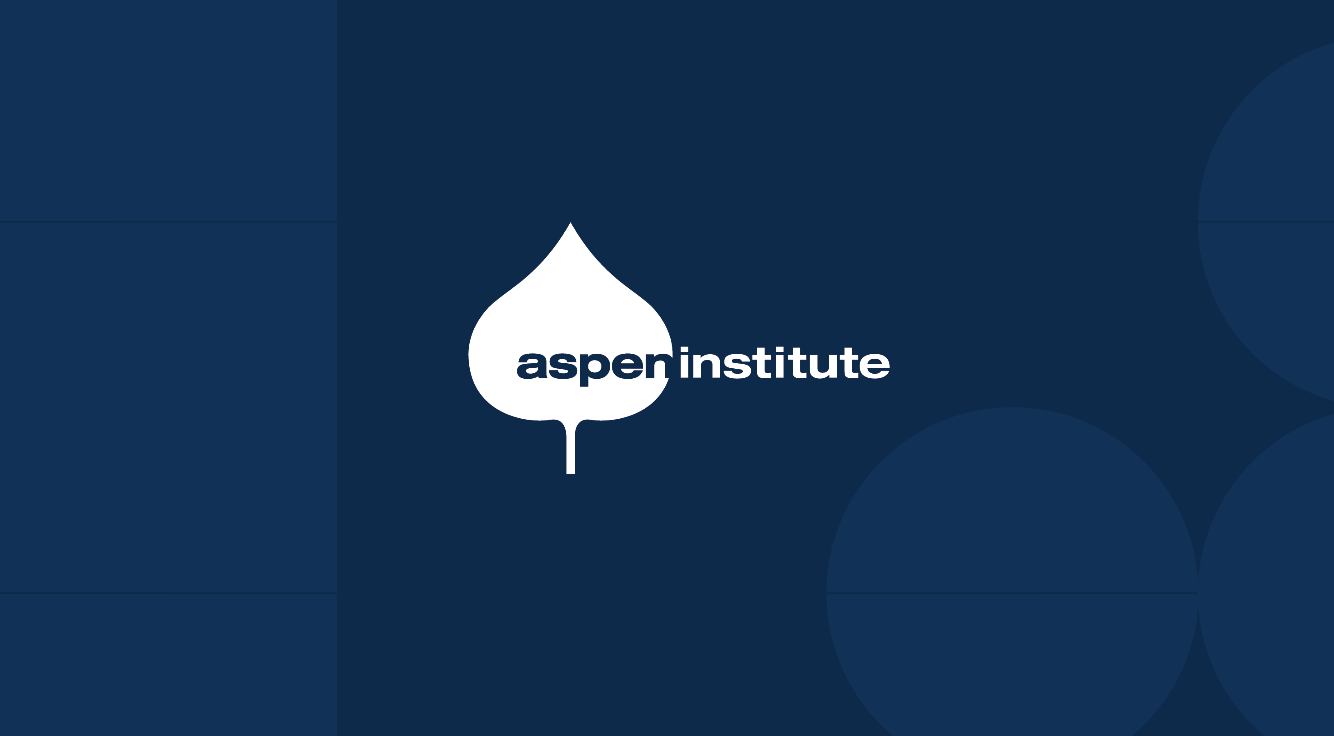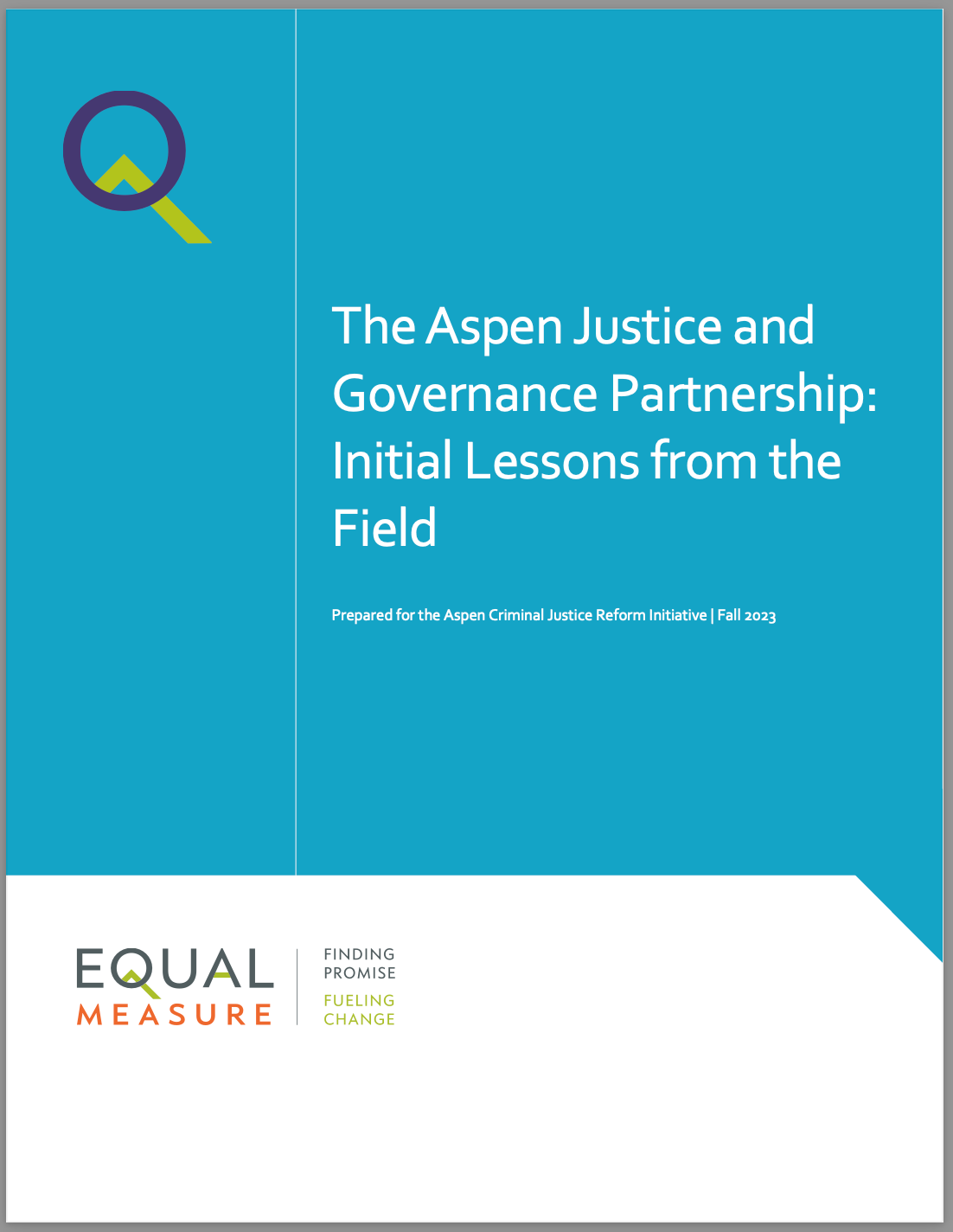Prosecutor-turned-activist Adam Foss will be speaking at the Aspen Institute Symposium on the State of Race in America, held at the Newseum on April 4 at 8:30 am. Before the event, which will explore new attitudes, opportunities, and challenges for and about people of color in the United States, Foss discussed his work, vision, and passion for combatting the inequities of the justice system.
You outlined your worldview at a TED Talk along with an appearance at the Aspen Ideas Festival a year ago. What have you been working on since then?
The last year has been about putting that view into actionable items. I started an organization that was aimed at training new prosecutors coming onto the job in a variety of skills and disciplines that have really nothing to do with the law but have everything to do with understanding the populations that we’re serving. What that has looked like is everything from creating a curriculum and getting partners on board to going out to district attorneys’ offices and getting their buy-in and doing workshops and trainings with folks all over the country. I made two international trips. Really the focus is on the training program, which is called Prosecutor Impact.
How does Prosecutor Impact work?
Think about other professions where people are dealing with other people’s lives — medicine, military, police departments. All of those folks are required to have some unique training other than their college or their graduate school. You go to residency, you go to police academy, you go to boot camp. That is not true of prosecutors. What Prosecutor Impact looks like is a monthlong training program for new prosecutors coming onto the job, or who have been on the job for a little while, to have three pillars of learning: One is academic, the second is experiential, and the third is leadership.
So on the academic side, we are learning things from adolescent brain development and human behavior to trauma and poverty and their intersection when it comes to crime to alternatives to incarceration in the jurisdictions where folks are working. The experiential side is to me some of the most important work. It’s taking folks from inside the courtroom and their offices out to the communities — visiting a jail, a homeless shelter, a mental health facility — and understanding what it’s like in the community. Or something as simple as taking a public city bus, which a lot of folks in the office have never done. Finally, the leadership training is about helping folks who are going to come into a system that is very set in its ways. How are you going to maintain lessons that you’ve learned in the face of an ornery judge, a cop that doesn’t like what you’re doing, or even a colleague that doesn’t agree with you? What sort of leadership skills do you need to not have the herd mentality, which was the problem in the first place?
What’s the most unexpected challenge you’ve had to face?
Honestly, it hasn’t been with the officers themselves — it’s been with funding, getting people to believe in the idea. People think it’s an amazing idea. What they have a hard time with is understanding the nuance of the prosecutor, and that’s why I’m so strongly advocating for this as the thing that’s going to end mass incarceration. People have all these preconceived ideas about the prosecutor, their methods, their motivations, and who had influence over them. So a lot of the time that I’m presenting is spent dispelling myths, which is not what I want to be doing. The other, larger piece is getting public support around prosecutors who are willing to take the step. It’s a challenge I anticipated, I just didn’t know how little people knew about their local prosecutor and what that looks like in terms of building capital for those people to take a risk.
You talked about dispelling myths. What do you wish people understood about our justice system?
Especially now, people see the outcome of mass incarceration or the criminal justice system and they’re horrified. And they fixate on these stories like Kalief Browder, or the person who’s doing life without parole for a gram of weed, or the police officer or prosecutor was hiding evidence, or the defense attorney who is sleeping with a client. They focus on the five percent. And in doing that, they don’t pay attention to what is actually driving mass incarceration and driving all these problems — the 95 percent of people in the middle who are just operating in a system that hasn’t been innovated in 300 years. It’s not the sexy stories, it’s the banal and mundane stuff that we don’t pay attention to because our brains are focused on other things like the private prison industry.
I think that when people do focus on huge conspiratorial things they lose agency in their control of the system. And what the general population doesn’t realize is that they drive policy. Look at Brock Turner and the sentence that he got. Everybody freaked out. And the next week they had a mandatory minimum sentence on the books. The public drives criminal justice policy. If I’m a citizen and next week the DA is making a public statement, I can go down there and confront the person.
It’s easy to feel disempowered or distant from the justice system. What are things that a member of the voting public can do to help?
There are lots of things. One is just getting informed by coming to community meetings. They have them all the time. It’s something that is readily accessible on the internet. Go to those community meetings and lend an ear — not as a savior, but just to understand what the real issues are. And then express either by waiting until the election (which I don’t advocate for because they are few and far between) or sending letters, making phone calls, showing up when the district attorney (who is a public figure) is making appearances — showing up and asking questions. All of these have an impact. They are elected, they want to stay elected, and they want to keep people happy. When the only people who are out here complaining are people who are directly impacted by the system, they are able to disqualify them because they’re seen as sour grapes. But when your voter base who isn’t impacted by the system is out there saying “we don’t like this either,” people start to pay attention and say we have to do something different.
One thing I really encourage people to do all the time is to visit a local courthouse. It’s open to the public for a reason, we just don’t do it. To understand the impact of citizens being in court, you have to be there. And as consumers of the criminal justice system, regardless of whether you’re being impacted by it, you’re paying for it. You wouldn’t continue paying for a product or continue donating to a nonprofit that wasn’t creating outcomes that you wanted. So why are you doing it with the criminal justice system?
Working for criminal justice reform, you’re up against centuries of racism and injustice. What keeps you driven despite those odds and despite that pressure?
One is that this lever, the prosecutor lever, has not been pulled. We’re starting from ground zero. And like anything, if it’s been untouched and you change a little bit, that change will grow exponentially. And with prosecutors, you’re working with individuals, you’re not working with the system. I’m not trying to make a policy, I’m trying to work with people when they come in, when they’re new and they have this energy that frankly all prosecutors have. We want to do something good for the community, we want to help people out. The system beats that out of us but it’s because we don’t take ownership over our discretion. I just think the opportunity to work in an area that has never been touched or innovated is great.
The other thing is, on November 8th, when all the craziness was happening, we fell asleep to something that I don’t think has ever happened before. If it has, it’s extremely rare. But on the same day, five incumbent DAs were voted out of their offices in major cities. For a variety of reasons, that never happens. And the reason that it happened this time around is that the communities started to wake up about the role of the prosecutor. And what that did was it empowered the people who are seeking that office who are progressive and are thinking about bigger things. But it also scared the people who have been sitting in those offices for a long time that they might not be as untouchable unless they start making some changes. It’s the confluence of those two things and the fact that there are younger generations going into the job all the time, their mindset has been shaped by the failure of the criminal justice system. It’s sort of the perfect storm.


